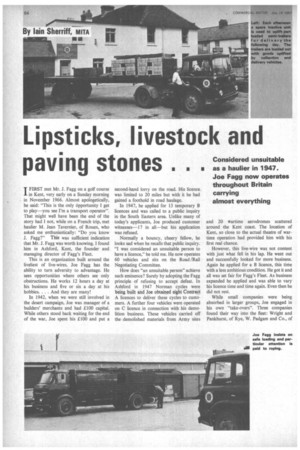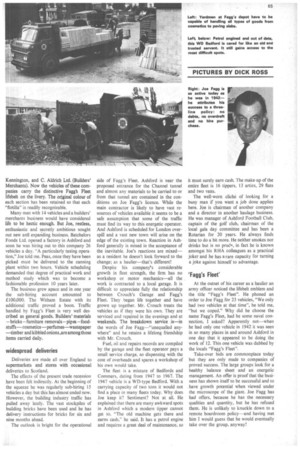Lipsticks, livestock and paving stones.
Page 66

Page 67

If you've noticed an error in this article please click here to report it so we can fix it.
IT FIRST met Mr. J. Fagg on a golf course 1 in Kent, very early on a Sunday morning in November 1966. Almost apologetically, he said: "This is the only Opportunity I get to play—you see I'm a transport operator". That might well have been the end of the story had I not, while on a French trip, met haulier M. Jean Tavernier, of Rouen, who asked me enthusiastically: "Do you know J. Fagg?" This was sufficient indication that Mr. J. Fagg was worth knowing. I found him in Ashford, Kent, the founder and managing director of Fagg's Fleet.
This is an organization built around the liveliest of live-wires. Joe Fagg has the ability to turn adversity to advantage. He sees opportunities where others see only obstructions. He works 12 hours a day at his business and five or six a day at his hobbies. . . . And they are many!
In 1942, when we were still involved in the desert campaign, Joe was manager of a builders' merchants and had £100 capital. While others stood back waiting for the end of the war, Joe spent his £100 and put a second-hand lorry on the road. His licence. was limited to 20 miles but with it he had gained a foothold in road haulage.
In 1947, he applied for 13 temporary B licences and was called to a public inquiry in the South Eastern area. Unlike many of today's applicants. Joe produced customer witnesses-17 in all—but his application was refused.
Normally a bouncy, cheery fellow, he looks sad when he recalls that public inquiry. "I was considered an unsuitable person to have a licence," he told me. He now operates 60 vehicles and sits on the Road /Rail Negotiating Committee.
How does "an unsuitable person" achieve such eminence? Surely by adopting the Fagg principle of refusing to accept defeat. In Ashford in 1947 Norman cycles were biitg built and Joeobtained eight Contract A licences to deliver these cycles to customers. A further four vehicles were operated on C licence in connection with his demolition business. These vehicles carried off the demolished materials from Army sites
and 20 wartime aerodromes scattered around the Kent coast. The location of Kent, so close to the actual theatre of wartime operation had provided him with his first real chance.
However, this live-wire was not content with just what fell in his lap. He went out and successfully looked for more business. Again he applied for a B licence, this time with a less ambitious condition. He got it and all was set fair for Fagg's Fleet. As business expanded he applied and was able to vary his licence time and time again. Even then he did not rest.
While small companies were being absorbed in larger groups, Joe engaged in his own "take-overs". Three companies found their way into the fleet: Wright and Pankhurst, of Rye, W. Padgarn and Co., of Kennington, and C. Aldrich Ltd. (Builders' Merchants). Now the vehicles of these companies carry the distinctive Fagg t Fleet lifebelt on the livery. The original colour of each section has been retained so that each "flotilla" is readily recognizable.
Many men with 14 vehicles and a builders' merchants business would have considered life to be hectic enough. But Joe, restless, enthusiastic and secretly ambitious sought out new and expanding business. Batchelors Foods Ltd. opened a factory in Ashford and soon he was hiring out to this company 26 vehicles a day. "A particularly taxing operation," Joe told me. Peas, once they have been picked must be delivered to the canning plant within two hours. Vehicle scheduling demanded that degree of practical work and method study which was to become a fashionable profession 10 years later.
The business grew apace and in one year the sub-hiring account amounted to £100,000. The Witham Estate with its additional traffic proved a boon. Traffic handled by Fagg's Fleet is very well described as general goods. Builders' materials — bricks — furniture removals pip es —foodstuffs — cosmetics —perfumes—wastepaper —timber and kibbled onions , are among th ose items carried daily.
widespread deliveries Deliveries are made all over England to supermarkets and stores with occasional deliveries to Scotland.
The effects of the present trade recession have been felt indirectly. At the beginning of the squeeze he was regularly sub-hiring 15 vehicles a day but this has almost ended now. However, the building industry traffic has pulled away lately. The vast stockpiles of building bricks have been used and he has delivery instructions for bricks for six and nine months ahead.
The outlook is bright for the operational side of Fagg's Fleet. Ashford is near the proposed entrance for the Channel tunnel and almost any materials to be carried to or from that tunnel are contained in the conditions on Joe Fagg's licence. While the main contractor is likely to have vast resources of vehicles available it seems to be a safe assumption that some of the traffic must find its way to this energetic operator. And Ashford is scheduled for London overspill and a vast new town will arise on the edge of the existing town. Reaction in Ashford generally is mixed in the acceptance of the inevitable. Joe's reactions are mixed— as a resident he doesn't look forward to the change; as a haulier—that's different!
Despite his company's considerable growth in fleet strength, the firm has no workshop or motor mechanics—all the . work is contracted to a local garage. It is difficult to appreciate fully the relationship between Crouch's Garage and Fagg's Fleet. They began life together and have grown up together. Mr. Crouch treats the vehicles as if they were his own. They are serviced and repaired in the evenings and at weekends. The breakdown service is—in the words of Joe Fagg—"unequalled anywhere" and he retains a lifelong friendship with Mr. Crouch.
Fuel, oil and repairs records are compiled by the garage and the fleet operator pays a small service charge, so dispensing with the cost of overheads and spares a workshop of his own would take.
The fleet is a mixture of Bedfords and Commers, dating from 1947 to 1967. The 1947 vehicle is a WD-type Bedford. With a carrying capacity of two tons it would not find a place in many fleets today. Why does Joe keep it? Sentiment? Not at all. He explained that there are many awkward spots in Ashford which a modern tipper cannot get to. "The old machine gets there and earns cash," he said. It has a petrol engine and requires a great deal of maintenance, so it must surely earn cash. The make-up of the entire fleet is 16 tippers, 13 artics, 29 flats and two vans.
The well-worn cliche of looking for a busy man if you want a job done applies here. Jpe is chairman of another company and a director in another haulage business. He was manager of Ashford Football Club, captain of the golf club, chairman of the . local gala day committee and has been a Rotarian for 20 years. He always finds time to do a bit more. He neither smokes nor drinks but is no prud,!, in fact he is known amongst his RHA colleagues as a practical joker and he has a rare capacity for turning a joke against himself to advantage.
'Fagg's Fleet' At the outset of his career as a haulier an army officer noticed the lifebelt emblem and the title "Fagg's Fleet". He phoned an order to Joe Fagg for 23 vehicles, "We only had two vehicles at that time", he told me, "but we coped." Why did he choose the name Fagg's Fleet, had he some naval connection, I asked? Apparently not—when he had only one vehicle in 1942 it was seen in so many places in and around Ashford in one day that it appeared to be doing the work of 12. This one vehicle was dubbed by the locals "Fagg's Fleet".
Take-over bids are commonplace today but they are only made to companies of proved success. The large groups look for a healthy balance sheet and an energetic management. An offer is proof that the business has shown itself to be successful and to have growth potential when viewed under the microscope of the giant. Joe Fagg has had offers, because he has the necessary qualities and quantity, but he has refused them. He is unlikely to knuckle down to a remote boardroom policy—and having met him I would guess that he would eventually take over the group, anyway!


























































































































